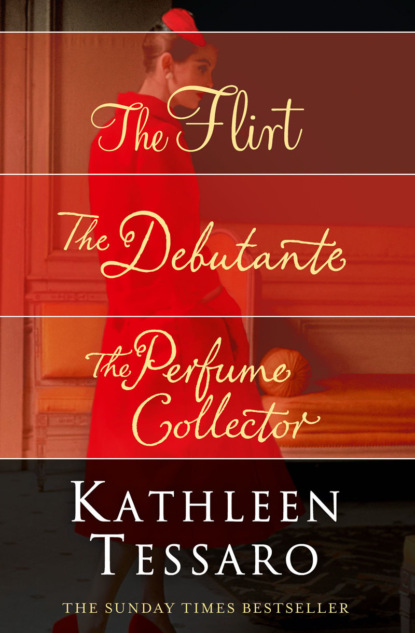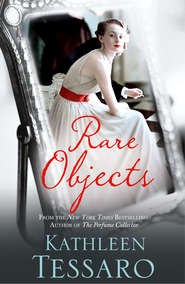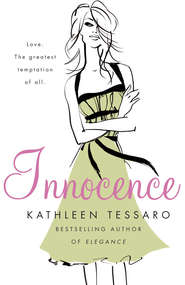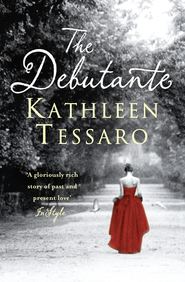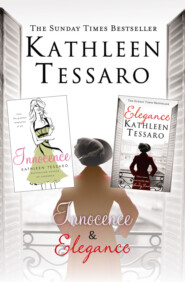По всем вопросам обращайтесь на: info@litportal.ru
(©) 2003-2024.
✖
Kathleen Tessaro 3-Book Collection: The Flirt, The Debutante, The Perfume Collector
Настройки чтения
Размер шрифта
Высота строк
Поля
Love According to Flick (#ulink_72c4289f-4f4a-5964-9390-d58542a5c99b)
Flick was waiting for Hughie the next day when he arrived at 111 Half Moon Street. No sooner had he walked in the door, than she took his arm, wheeling him out again.
‘Come with me,’ she commanded.
Once outside, she marched him across the road to a small Italian café, where they ordered coffee and Hughie took advantage of the opportunity to down a second breakfast.
‘You’re in the doghouse,’ Flick announced, watching as he polished off two fried eggs, sausage, bacon, tomato, mushrooms and four slices of toast slathered in butter and marmalade in the same amount of time it would take most people to break open and butter a croissant.
‘Yep,’ Hughie nodded unperturbed. ‘Never had a job yet where the doghouse didn’t have my name on it.’
Flick took a dainty sip of latte. ‘Well, let’s see what we can do to get you out. I’ve never asked any of the other boys to help me with a project like this one, Hughie, for the simple reason that it requires a certain lightness of touch; an almost magical belief in the power of romance. Flirting is one thing, but this is quite another. I think you have that unique sensibility so I’m giving you a chance to prove yourself – to me, to Valentine, but also to yourself.’ She placed her cup back on its saucer. ‘Now, let’s start with the basics. What do you think the most potent, erotic part of a woman is?’
Hughie concentrated. ‘It’s a toughie,’ he conceded, ‘but I’m going to have to say the tits.’
‘You’re wrong.’
‘Damn! Well, it was between the two—’
‘It’s the imagination,’ Flick quickly cut in, ‘the imagination, Hughie. If you can capture a woman’s imagination, then you will have her. But imagination is a strange creature. It needs time and distance to function properly.’
Hughie nodded.
‘Do you understand what that means?’
He shook his head.
‘It means that a seduction that takes place slowly, with only the most exquisite images and experiences for the imagination to work on and grab hold of, will yield powerful results. This is our challenge: to stimulate the senses, evoke love and inspire lust without ever being seen.’
‘Tricky.’
She considered. ‘Not as tricky as one might think. In any good seduction, the person being seduced does most of the work anyway. And remember, I use the words “love” and “lust” but what I’m really referring to is romance.’
‘What’s the difference?’
‘Oh, there’s a huge difference!’ she laughed. ‘Romantic love is an illusion, Hughie. It can be manipulated, twisted, piled up like a bunch of fun-house mirrors. The very nature of it is deceptive. It promises closeness but the only thing it ever really reveals is the dreams and fears of the person with the obsession. That’s why it’s so easy to control.’
‘Hey, that’s a bit harsh! You don’t really believe that, do you?’ he laughed nervously. She painted an altogether darker picture of his noble new profession. ‘I mean, what about love at first sight? Romeo and Juliet and all that?’
‘This is why I chose you, Hughie,’ she winked. ‘Because you’re young and fresh and still believe Santa Claus is going to shimmy down your chimney come Christmas Eve. That’s going to come in handy.’ She signalled for the bill. ‘This is a business. We provide a service. And like most service-orientated professions, we exploit a basic human need. In our case that need is the desire to be loved. Most people want to be adored but they don’t want to do anything to get it. They simply want some attractive stranger to come along out of the blue and find them irresistible. If it were any more complicated than that, we’d be out of a job.’
It sounded a bit too familiar; Leticia was a beautiful stranger who’d seduced him on a bus. One minute he was single, lonely; the next head over heels. But was all the intensity love or something else entirely?
The question frightened him. He pushed it out of his mind.
‘Now,’ she continued briskly, ‘we’ve received a commission for a woman in Chester Square – a wealthy, elegant, sophisticated and very well-known woman named Olivia Bourgalt du Coudray.’
‘Married to that tennis-ball chap, right?’
‘Exactly.’ She took out her wallet.
‘Oh, please! Allow me!’
Flick looked at him. ‘Do you actually have any money, Hughie?’
‘Well, not as such. But I’ve got an Amex card.’
‘Why don’t I take a rain check?’ She took a tenner from her wallet, handed it to the waiter. ‘Come on.’
They strolled out into the sun.
She slipped her arm through his. ‘You see, the truth is no one ever really falls in love with anyone but themselves. Love is a mirror; a reflective surface projecting who we wish we were. What we’re all waiting for is someone to come along who will show us something new about ourselves that we can adore. And then, because someone loves us, in turn, we love ourselves. Does that make sense?’
Hughie grunted. It was all getting a bit philosophical. Besides, some lucky sod had just driven by in a new TVR.
Flick took his grunt as a sign of admiration for her powers of perception. ‘Now, a good Cyrano,’ she continued, ‘is a combination of boldness and unavailability. But the beginning is always simple.’ She linked her arm through his. ‘And so our first stop is Smythson’s.’
‘What’s a Cyrano?’
‘Ah,’ she smiled, ‘I thought you’d never ask!’
The History of the Cyrano(Another Digression) (#ulink_da413e01-d38f-525b-ac11-6052ae84cdfd)
During the dark days of the Second World War, when London was a smouldering shadow of its former imperious self, the Charleses’ shop in St James’s was badly bombed. Celia and the Baron were older now; frailer, living off rations, renting rooms above a bookshop in Curzon Street. Their staff of flirts had all been drafted, some wounded, some killed, serving in Europe, Africa, even Japan. For a while a very handsome Polish refugee named Milos filled in. He had a limp and his English was confusing. But eventually even he was rounded up and sent to work in a munitions factory in Yorkshire. Of course the hairdressing side of the business failed completely; not many women had the money or need for elaborate hairstyles and for those who could afford it, sitting in a front room above a bookshop wouldn’t do. Besides, times moved on. Permanent waves were all the rage.
In short, the world was ending. Hitler was invading; London destroyed. And all that was beautiful, was gone.
The Baron took it badly. He’d once pulled himself up by his bootstraps, known greatness; inspired love. Now he was left to sort through dusty second-hand books all day in the shop below while his wife Celia, a woman of property and social standing, scoured the streets for anything of value left in the bomb wreckage.
But life wants love. It demands it.
And so it came to pass that on a dark moonless evening, during the bitterest of winter months, in the middle of a blackout with sirens wailing, a young man rang the bell in Curzon Street.
Cursing, the Baron stumbled down the narrow stairs and opened the door.
It was a soldier, a young captain, beside himself with anxiety, clutching a photograph of the girl he loved. You see, he explained, breathless, his father had told him about the Baron, recommended he find him; said, in fact, that he was the only man in England who could possibly help.
As you can imagine, this bolstered the Baron’s ego no end. In a flash the young man was upstairs, drinking a hot cup of tea, explaining to both Celia and the Baron his terrible predicament. He loved this girl. And he was quite sure she loved him, only she had a rather fickle nature. The thing was, he just didn’t think he could bear to go off to war, to possible death, without knowing for certain that she would remain faithful.
They nodded.
It was an unusual commission, still, something might be done.
And where could they find her?
‘Well,’ he smiled nervously, ‘only in the most beautiful village in Wales!’
Ah.





